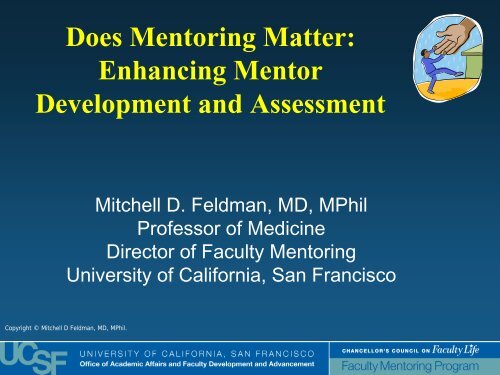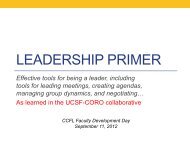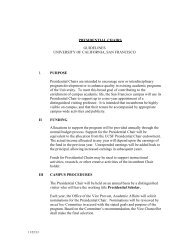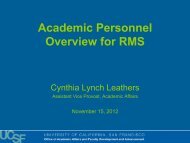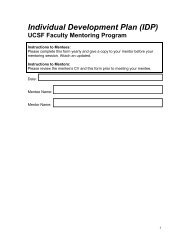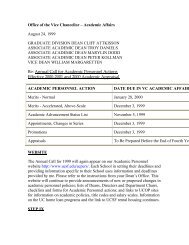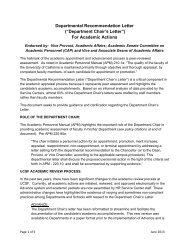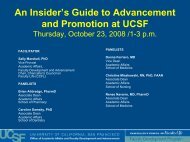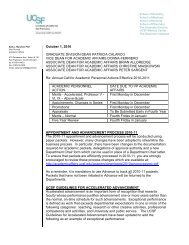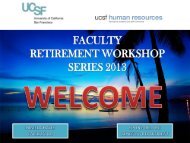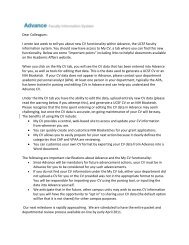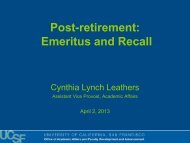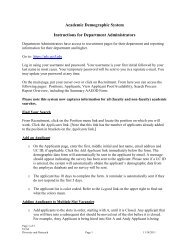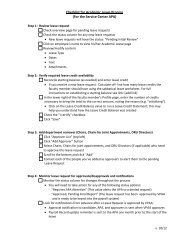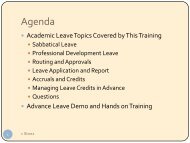Mentor as a - Academic Affairs - University of California, San Francisco
Mentor as a - Academic Affairs - University of California, San Francisco
Mentor as a - Academic Affairs - University of California, San Francisco
- No tags were found...
Create successful ePaper yourself
Turn your PDF publications into a flip-book with our unique Google optimized e-Paper software.
Copyright © Mitchell D Feldman, MD, MPhil.
What is <strong>Mentor</strong>ing?Levinson DJ: “The Se<strong>as</strong>ons <strong>of</strong> a Man’s Life”.New York, Alfred A Knopf, 1978• The mentoring relationship is “one <strong>of</strong> themost complex and developmentallyimportant” in a persons life.• The mentor will . . . “<strong>as</strong>sist and facilitate therealization <strong>of</strong> the dream.”Copyright © Mitchell D Feldman, MD, MPhil.
<strong>Mentor</strong>ing is“ A dynamic, reciprocal relationship in awork environment between an advancedcareer incumbent and a beginner aimed atpromoting the development <strong>of</strong> both.”Healy, Educ Res. 1990; 19:17-21.Copyright © Mitchell D Feldman, MD, MPhil.
<strong>Mentor</strong> <strong>as</strong> Role ModelQuickTime and aTIFF (Uncompressed) decompressorare needed to see this picture.• A person considered<strong>as</strong> a standard <strong>of</strong>excellence to beimitated (Wright, et al)Copyright © Mitchell D Feldman, MD, MPhil.
<strong>Mentor</strong> <strong>as</strong> Teacher• Educate menteeabout researchcontent and methods• Clinical/teaching skills• How things workCopyright © Mitchell D Feldman, MD, MPhil.
<strong>Mentor</strong> <strong>as</strong> Superhero• Protector• AdvocateCopyright © Mitchell D Feldman, MD, MPhil.“<strong>Mentor</strong> can manipulate the worldaround him with his mind.”
<strong>Mentor</strong> <strong>as</strong> Advisorand Guide• ‘a trusted counselor orguide’• Self reflection andvalue clarificationCopyright © Mitchell D Feldman, MD, MPhil.
<strong>Mentor</strong> <strong>as</strong> a “Guiding Light”“How to <strong>Mentor</strong> and Find Life’s Purpose” Eric Liu• OED: <strong>Mentor</strong> is ‘atrusted counselor orguide’Copyright © Mitchell D Feldman, MD, MPhil.
<strong>Mentor</strong>ing and Personal/Pr<strong>of</strong>essionalBalance• “We have spentcountless hours . . .planning my career,talking about family andhow to live meaningfullyand find happiness in theworkplace and home.”– UCSF Faculty MenteeCopyright © Mitchell D Feldman, MD, MPhil.
The Art <strong>of</strong> <strong>Mentor</strong>ing“He knows what each plant in his garden needs to thrive:this one a little more sun, this one more fertilizer; this is agood metaphor for his mentoring [<strong>as</strong>] he takes the samecareful approach with ‘growing’ his fellows and takesgreat joy in watching them bloom.”UCSF Lifetime Achievement in <strong>Mentor</strong>ing Award NomineeCopyright © Mitchell D Feldman, MD, MPhil.
The Art <strong>of</strong> <strong>Mentor</strong>ing“ During the launching <strong>of</strong> my career, [she] w<strong>as</strong> like a SolidRocket Booster, ensuring that I achieve the lift andtrajectory to make it into orbit. But rather than dropping<strong>of</strong>f at that point, she h<strong>as</strong> remained a constant feature, likeMission Control, monitoring my progress.”“Most importantly, (my mentor) h<strong>as</strong> no intellectualjealousy. She w<strong>as</strong> always happy to see others succeed,pushing them forward into the limelight while standingback in the shadows herself.”Copyright © Mitchell D Feldman, MD, MPhil.UCSF Lifetime Achievement in <strong>Mentor</strong>ing Award Nominees
Desired Characteristics <strong>of</strong> <strong>Mentor</strong>sSambunjak JGIM 2010• Personal– Altruistic– Patient– Honest– Motivator– Active Listener– Non-judgmental– Reliable• Relational– Accessible– Holds a high standard– Compatible (‘good match’)• Pr<strong>of</strong>essional– Senior/well respected infield– Knowledgeable andexperiencedCopyright © Mitchell D Feldman, MD, MPhil.
Effective Communication: TheKey to Effective <strong>Mentor</strong>ingEarFull attentionEyes• ““The single biggest problem incommunication is the illusion that ith<strong>as</strong> taken place”» George Bernard ShawTo ListenOneHeart• “Courage is what it takes to standup and speak; it is also what it takesto sit down and listen.”» Winston ChurchillCopyright © Mitchell D Feldman, MD, MPhil.
Copyright © Mitchell D Feldman, MD, MPhil.<strong>Mentor</strong>ing Programs
Does <strong>Mentor</strong>ing Matter?• Systematic review found <strong>as</strong>sociation between having amentor and: Completing a research project Number <strong>of</strong> publications Likelihood <strong>of</strong> obtaining a grant• Lack <strong>of</strong> a mentor <strong>as</strong>sociated with inability to complete a project or obtain agrant (Sambunjak JAMA 2006)• Survey <strong>of</strong> NRSA research fellows; those with an ‘influential’mentor more likely to have funding and to publish 1 or morepapers per year. (Steiner JGIM 2002)• Junior faculty with mentors have higher self efficacy (Feldman2010)Copyright © Mitchell D Feldman, MD, MPhil.
Programmatic <strong>Mentor</strong>ingModels• Traditional dyad (senior/protégé)• Peer mentoring• Near-peer mentoring• Team mentoring• Distance mentoring• Scope (project specific - broad)• Time commitment (limited - open-ended)• Recognition (paid - voluntary)Copyright © Mitchell D Feldman, MD, MPhil.
Characteristics <strong>of</strong> SuccessfulPrograms• Structure and flexibility• Defined expectations• Clear and tangible outcomes• School and departmental leaders hip• Reward and recognition• Administrative commitment• Evaluation - process and outcomesCopyright © Mitchell D Feldman, MD, MPhil.
Enhancing <strong>Mentor</strong>ingCompetenciesCopyright © Mitchell D Feldman, MD, MPhil.
<strong>Mentor</strong>ing Skills ModelMENTEESPECIFICSKILLSLearningQuicklyShowingInitiativeFollowingThroughCopyright © Mitchell D Feldman, MD, MPhil.SHARED CORE SKILLSAcquiring<strong>Mentor</strong>sManagingtheRelationshipSelf ReflectionEIIdentifying Goals& Current RealityBuilding TrustEncouragingSense <strong>of</strong> HumorActive ListeningInspiringProvidingCorrectiveFeedbackInstructing/DevelopingCapabilitiesEncourage/ ManageRisksOpeningDoorsMENTORSPECIFICSKILLS
Checklist for Mentees1. Find a mentor . . . or two2. Clarify your values and goals3. Take charge <strong>of</strong> the relationship4. Separate gracefullyCopyright © Mitchell D Feldman, MD, MPhil.
1. Finding a <strong>Mentor</strong> . . . or two• CompetencePr<strong>of</strong>essional and interpersonal skills,knowledge, and experience• ConfidenceShares network, resources and creditProvides opportunities, supports risks• CommitmentInvests time and energy to mentoring<strong>Mentor</strong> should be available and accessibleCopyright © Mitchell D Feldman, MD, MPhil.
Direction-Self-Direction ScaleGoal: Guided independence and accomplishmentMicromanagementSink or Swim1 2 3 4 5 6 7 8 9 10Source: Lee A, Dennis C, Campbell P. Nature’s guide for mentors. Nature. 2007; 447 (7146):791-7.Copyright © Mitchell D Feldman, MD, MPhil.
2. Clarify values and goals:Nine Step Strategy for Mentees1. Clarify your governing values2. Prioritize your values3. Identify your strengths4. Where do you want to be 10 years from now? (consistentwith values?)5. How will you get there (1, 3, 5 year goals)6. What skills or t<strong>as</strong>ks do you need to achieve your oneyear goals?7. Write a learning contract for each t<strong>as</strong>k.8. Involve your mentor.9. Repeat steps 6 and 7 for 3 and 5 year goals.Copyright © Mitchell D Feldman, MD, MPhil.(Pololi, 2006)
The Individual Development Plan (IDP)• Self evaluate career success skillsand interests Clinical Creative/scholarly Teaching/mentoring Leadership/management Interpersonal• Values - personal and pr<strong>of</strong>essional• Short and Long term goalsCopyright © Mitchell D Feldman, MD, MPhil.
“When preparing for battle,I have found that planning is essential,but plans are useless.”Dwight D. EisenhowerCopyright © Mitchell D Feldman, MD, MPhil.
Making the Most <strong>of</strong> <strong>Mentor</strong>s• “The mentee is not an empty vesselreceiving the mentor’s advice andwisdom but, rather, an activeparticipant, shaping the relationship.”Zerzan et al. 2009Copyright © Mitchell D Feldman, MD, MPhil.
3. Take charge <strong>of</strong> the Relationship• “Managing up” -- the mentee takesownership <strong>of</strong> and directs the relationship,letting the mentor know what he or sheneeds . . . Managing up makes it e<strong>as</strong>ier fora mentor to help a mentee, which makesthe relationship more satisfying andsuccessful for both.”Copyright © Mitchell D Feldman, MD, MPhil.
HighImpact <strong>of</strong> Support and Challengeon Mentee Development(Daloz, 1999)RetreatGrowthChallengeSt<strong>as</strong>isConfirmationLowCopyright © Mitchell D Feldman, MD, MPhil.SupportHigh
4. SeparationFreud and Jung10 year collaborationended in 1914 withphilosophical schism--and with sexualsuspicions andblackmail.Copyright © Mitchell D Feldman, MD, MPhil.
<strong>Mentor</strong> RoleConflictsRole demands <strong>of</strong> adirect supervisormay conflict withthe role demands<strong>of</strong> a mentorManipulativeBehaviorInappropriatedelegationCredit takingDyad MismatchValuesWork stylePersonalityNegative<strong>Mentor</strong>ingExperiencesDistancingBehaviorNeglect (mostcommon negativebehavior)Lack <strong>of</strong> mentorexpertiseInterpersonaland/ortechnicalincompetenceGeneralDysfunctionalityBad attitudePersonal problemsCopyright © Mitchell D Feldman, MD, MPhil.Eby 2000
The <strong>University</strong> <strong>of</strong> <strong>California</strong>, <strong>San</strong> <strong>Francisco</strong>Mission Faculty Bay Ro<strong>of</strong>top <strong>Mentor</strong>ing <strong>of</strong> Program Genetech HallCopyright © Mitchell D Feldman, MD, MPhil.
UCSF Faculty <strong>Mentor</strong>ing Program• Faculty <strong>Mentor</strong>ing Program launched in 2006 -2007 in response to dissatisfaction withavailability and quality <strong>of</strong> mentoring at UCSF• B<strong>as</strong>eline survey revealed:– More than 1/3 <strong>of</strong> faculty cannot identify a mentor– Those without mentors more likely to spend moretime teaching and/or in clinical activities– Those with mentors have greater academic selfefficacyCopyright © Mitchell D Feldman, MD, MPhil.(Feldman, 2010)
UCSF Faculty <strong>Mentor</strong>ing Program• Disseminated model: <strong>Mentor</strong>ing Facilitators• One on One career mentoring the mentee is expected to send their mentor an updatedCV and Individual Development Plan prior to eachmeeting.• <strong>Mentor</strong>/mentee development– Workshops (speed mentoring), Dept retreats and GrandRounds, FIWW etcCopyright © Mitchell D Feldman, MD, MPhil.
Executive ViceChancellor andProvostVice Provost<strong>Academic</strong> <strong>Affairs</strong>Chancellor’sCouncil onFaculty LifeAssociate Deans<strong>Academic</strong> <strong>Affairs</strong>Director <strong>of</strong> Faculty<strong>Mentor</strong>ingSchool <strong>of</strong>DentistrySchool <strong>of</strong>NursingSchool <strong>of</strong>PharmacySchool <strong>of</strong>Medicine<strong>Mentor</strong>ingFacilitators(Dept/ORU)<strong>Mentor</strong>ingFacilitators(Dept/ORU)<strong>Mentor</strong>ingFacilitators(Dept/ORU)<strong>Mentor</strong>ingFacilitators(Dept/Div/ORU)Copyright © Mitchell D Feldman, MD, MPhil.<strong>Mentor</strong>/Menteepairs<strong>Mentor</strong>/Menteepairs<strong>Mentor</strong>/Menteepairs<strong>Mentor</strong>/Menteepairs
Creating a Culture <strong>of</strong> <strong>Mentor</strong>ing• <strong>Mentor</strong>ing Counts in Advancement and Promotion• <strong>Mentor</strong>ing Awards“FMP Lifetime Achievement in <strong>Mentor</strong>ing Award”, <strong>Academic</strong>Senate DIM Awards; “FMP Who mentored you?”• Evaluation <strong>of</strong> <strong>Mentor</strong>sCopyright © Mitchell D Feldman, MD, MPhil.
A Team <strong>of</strong> <strong>Mentor</strong>s• Career <strong>Mentor</strong>: Responsible for overall career guidance andsupport for their mentee. Often affiliated with the Faculty<strong>Mentor</strong>ing Program, the career mentor may or may not also serve<strong>as</strong> the scholarly mentor (see below). Scheduled meetings takeplace at le<strong>as</strong>t 2-3 times per year.• Research (Scholarly) <strong>Mentor</strong>: Responsible for developing thecreative and/or independent research careers <strong>of</strong> their mentees.Unlike the career mentor, the scholarly mentor must haveexpertise in the mentee’s area <strong>of</strong> scholarship and help provideresources to support the mentees work. Scheduled meetings takeplace 1-2 times per month.• Co-<strong>Mentor</strong>: Works with the mentee and scholarly mentor toprovide specialized content area or methodological expertise.Scheduled meetings every 1-3 months.Copyright © Mitchell D Feldman, MD, MPhil.
Copyright © Mitchell D Feldman, MD, MPhil.
Copyright © Mitchell D Feldman, MD, MPhil.
Copyright © Mitchell D Feldman, MD, MPhil.
<strong>Mentor</strong> Development ProgramCopyright © Mitchell D Feldman, MD, MPhil.Bringing better health to more people more quickly!
Copyright © Mitchell D Feldman, MD, MPhil.
CTSI <strong>Mentor</strong> Development Program• Goal: To train mid-career and early senior CT researchers inmentoring skills - build a community <strong>of</strong> mentoring excellence• Senior mentors and MITs - discussion and networking• 10 c<strong>as</strong>e b<strong>as</strong>ed seminars over 5 months– http://ctsi.ucsf.edu/training/mdp-materialsCopyright © Mitchell D Feldman, MD, MPhil.
CTSI <strong>Mentor</strong> Development Program• Sample seminars: “Rewards and Challenges”; “FiscalRealties”; “Leadership Skills”; “Grants”; Diversity• To date: 38 graduates; 16 current MITs• Graduates report incre<strong>as</strong>ed confidence in mentoring skills(Feldman et al. 2009)• Model program for national network <strong>of</strong> CTSAs**(Johnson et al. <strong>Academic</strong> Medicine 2010)Copyright © Mitchell D Feldman, MD, MPhil.
Pr<strong>of</strong>iles: <strong>Mentor</strong> - Mentee MatchingCopyright © Mitchell D Feldman, MD, MPhil.Bringing better health to more people more quickly!
Copyright © Mitchell D Feldman, MD, MPhil.
Copyright © Mitchell D Feldman, MD, MPhil.Find People
Copyright © Mitchell D Feldman, MD, MPhil.Pr<strong>of</strong>iles
Copyright © Mitchell D Feldman, MD, MPhil.
Key Issues to start and sustain amentoring program• Buy in/support frominstitutional leadership• Make the business c<strong>as</strong>e• Central guidance andaccountability butencourage local innovation• Recognition and rewardsfor mentorship• <strong>Mentor</strong>/menteedevelopmentCopyright © Mitchell D Feldman, MD, MPhil.
“Meaning is not something you stumbleacross, like the answer to a riddle or the prizein a tre<strong>as</strong>ure hunt. Meaning is something youbuild into your life. You build it out <strong>of</strong> your ownp<strong>as</strong>t, out <strong>of</strong> your affections and loyalties . . .out <strong>of</strong> your own talent and understanding, out<strong>of</strong> the things you believe in, out <strong>of</strong> the thingsand people you love, out <strong>of</strong> the values forwhich you are willing to sacrifice something.”Copyright © Mitchell D Feldman, MD, MPhil.John Gardner
Copyright © Mitchell D Feldman, MD, MPhil.THANK YOU


